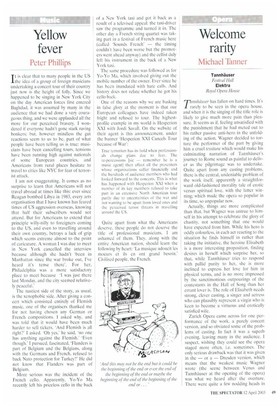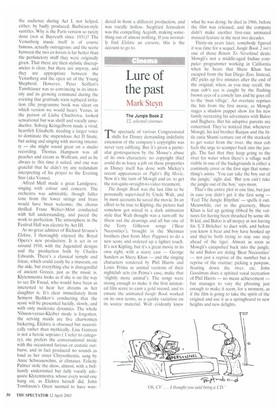Welcome rarity
Michael Tanner
Tannhauser Festival Hail Elektra Royal Opera House
7-11inhauser has fallen on hard times. It's / rarely to be seen in the opera house, and when it is the singing of the title role is likely to give much more pain than pleasure. It seems as if, feeling unsatisfied with the punishment that he had meted out to his rather passive anti-hero in the unfolding of the action. Wagner decided to torture the performer of the part by giving him a cruel tessitura which would make his culminating narration of Tannhauser's journey to Rome sound as painful to deliver as the pilgrimage was to undertake. Quite apart from any casting problems, there is the central, undeniable problem of the work itself, apparently a straightforward old-fashioned morality tale of erotic versus spiritual love, with the latter winning; which made the opera so popular in its time, so unpopular now.
Actually, things are more complicated than that, but Wagner was untrue to himself in his attempt to celebrate the glory of chastity, not something that one would have expected from him. While his hero is oddly colourless, in each act reacting to the situation he finds himself in rather than taking the initiative, the heroine Elisabeth is a more interesting proposition, finding desires in herself which surprise her, so that, while Tannhauser tries to respond with pallid purity to her, she is more inclined to express her love for him in physical terms, and is no more impressed by the sanctimonious outpourings of the contestants in the Hall of Song than her errant lover is. The role of Elisabeth needs strong, clever casting, a singer and actress who can plausibly represent a virgin who is keen to become a virtuous and erotically satisfied wife.
Zurich Opera came across for one performance of the work, a purely concert version, and so obviated some of the problems of casting. In fact it was a superb evening, leaving many in the audience, I suspect, wishing they could see the opera staged more often, i.e. sometimes. The only serious drawback was that it was given in the — or a — Dresden version, which means that the weakest music Wagner wrote (the scene between Venus and TannUuser at the opening of the opera) was what we heard after the overture. There were quite a few nodding heads in the audience during Act I, not helped, either, by badly produced, Barbican-style surtitles. Why is the Paris version so rarely done (not at Bayreuth since 1931)? The Venusberg music itself is of course famous, actually outrageous; and the scene between the two ex-lovers is far better than the perfunctory stuff they were originally given. That there are then stylistic discrepancies is clear, but there are anyway, and they are appropriate between the Venusberg and the open air of the Young Shepherd. However, Peter Seiffert's Tannhauser was so convincing in its intensity and its growing command during the evening that gratitude soon replaced irritation (the programme book was silent on which version we would hear). Venus, in the person of Liuba Chuchrova, looked sensational but was shrill and vocally unseductive. Solveig Kringelborn made a vivid, heartfelt Elisabeth, needing a larger voice to dominate the stupendous Act II finale, but acting and singing with moving intensity — she might sound great on a studio recording. Thomas Hampson was all peaches and cream as Wolfram, and as he always is: this time it suited, and one was grateful that he didn't try any redundant interpreting of his prayer to the Evening Star (aka Venus).
Alfred Muff made a great Landgrave, singing with colour and concern. The orchestra was admirable, though fuller tone from the lower strings and brass would have been welcome; the chorus thrilled. Franz Welser-Most conducted with full understanding, and paced the work to perfection. The atmosphere in the Festival Hall was electric by Act III.
As no great admirer of Richard Strauss's Elektra, I thoroughly enjoyed the Royal Opera's new production. It is set in or around 1910, with the Jugendstil designs and the production both by Charles Edwards. There's a classical temple and frieze, which could easily be a museum, on the side, but everything else is disregardful of ancient Greece, just as the music is. Klytemnestra looks as if she is on the way to see Dr Freud, who would have been as interested to hear her dreams as her daughter is. It's clear immediately from Semyon Bychkov's conducting that the score will be presented lucidly, slowly, and with only moderate dynamics. The whole Nilsson-versus-Kleiber mode is forgotten, the serving maids are five charwomen bickering, Elektra is obsessed but neurotically rather than mythically. Lisa Gasteen is not a heroic soprano ( I refer to category), she prefers the conversational mode with the occasional furious or ecstatic outburst, and in fact produced no sounds as loud as her sister Chrysothemis, sung by Anne Schwanewilms, at climaxes. Felicity Palmer stole the show, almost, with a brilliantly understated but fully vocally adequate Klytemnestra, whose every word one hung on, as Elektra herself did. John Tomlinson's Orest seemed to have wan
dered in from a different production, and was vocally hollow. Siegfried Jerusalem was the compelling Aegisth, making something out of almost nothing. If you normally find Elektra an earsore, this is the account to go to.



































































 Previous page
Previous page